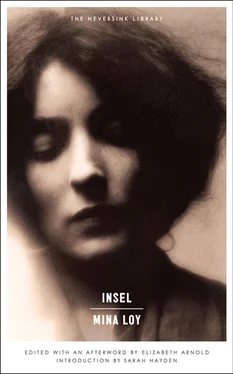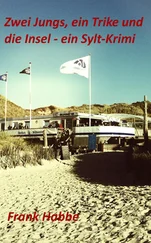“If only we could sit here eternally it would be wunderbar —it’s just like sitting in the kitchen.”
“The kitchen?” I exclaimed.
“Ah, yes,” he sighed. “All my youth I ate in the kitchen together with my Vater und Mutter and the other five children.” Then, inhaling the effluvia of the streets, “There was lots of steam,” he said invigorated. “All the washing hung up to dry, the muddy boots stood in a row, and on the good hot stove—”
“Die Suppe ,” I joined in, entranced.
“Ja, die Suppe ,” he confirmed ecstatically. “You see, it is not so much a matter of materializing but of being able to speak. Before I found you I had never anyone I could speak to. I should never have been able to tell about all this—”
“All the boots?” I interrupted.
“—to anyone else,” he concluded, his voice trailing off as if calling to me from another world.
“Allein — allein ,” he chanted forsakenly. Something was happening to this man’s voice, the most musical modulations were stealing into it. “Always alone — alone in Berlin — alone in Paris—” The words floated out of him like wisps of a dream, “more than alone in prison.”
“In prison,” I responded, “where there is no one, no one you can convince of your not being there. You might try it on the warden, but the moment he began to suspect would be the very moment he assured himself of your presence — I mean — let’s leave that and have something more to eat!”
In sitting so close to Insel at the small terrace table all the filaments of what has been called the astral body, that network of vibrational force, were being drawn out of me towards a terrific magnet, while I sat unmoved beside the half-rotten looking man of flesh. My astral inclination, withheld by a counteractive physical repulsion, could not gain its presumable end of flying onto that magnet— It was as though he had achieved an impossible confusion of his positive and negative polarity— Out of a dim past echoed the din of a music hall refrain I had heard in Berlin: “ Du musst herüber — You must come over.”
THE LESS HE SEEMED TO BE “THERE,” THE MORE HE spilled into the unknown, the more clearly I apprehended him, whereas Insel himself seemed ever to be seeking a reduction of focus through which to penetrate into the real world.
Suddenly he bowed his head over me in a wracking attentiveness. He had found such a focus. Darting, his constricted fingers cleaved to a white hair of my head which had fallen on my coat, he made a ritual of offering it to my eyes.
“Je suis la ruine féerique ,” I trilled in vanity.
“Ah, yes,” sighed Insel, as I translated, churning me with his eyes into the colorless vapors of his creation.
The cloth of my coat, a FANTAISIE, was sewn with lacquered red setae — wisps, scarcely attached, which caught the light, and all through the evening unusual manifestations of consciousness occurring outside the Lutetia were punctuated by Insel’s staccato spoliation of that hairy cloth. He could not desist. Like an adult elf insanely delousing a mortal, whenever I laughingly reprimanded him for ruining my coat, with an acrid cluck of refutation he would show me what he had instantly plucked from the cloth — it was always a white hair— He did not trouble to contradict me — the evidence was clinching— But in the end the side of my coat sitting next to him was bare of all its fancy setae.
In accordance with the rules of sympathetic magic, so long concealing my one fallen hair in his palm augmented Insel’s influence over me. An influence which, rather than having submitted to it, I purposely invaded, so urgent was my premonition of some treasure he contained. His voice now setting in a glowing duskiness haunted me with wonder as to where I had heard it before—
“Black as was the stain on my name—,” I listened to Insel intoning as if he were celebrating mass, “even so white would I wash it in glory—.”
Rising for a moment from the fantastic shallows of his cerebral proximity to my normal level, “This man is fearfully banal,” I said to myself, discerning in his confidences the prim hypocrisy of a wastrel bamboozling the patroness of some charitable institution. Any such patroness would have cried for help should she receive him as he was at present plunged in the depths of a subverted exaltation, so awesomely he stressed his lonely agony, his long starvation, the incidentless introspection of that enjailed jewel, his artist spirit. As for me, the fundamental lacuna in my experience was being “stopped up” with his moral man. The pattern held out to my early ethical life. The man who stones. He who unsuspectingly lingers in the world subconscious.
I did not care whom he bamboozled. Slipping back into his sensitized zone, I swallowed his platitudes gratefully. So seldom had I come across anything sufficiently condensed to satisfy my craving for “potted absolute.” This man sufficed me as representing all the hungry errantry of the human race.
“What are you trying to be anyhow?” I asked bemused. “La faim qui rode autour des palaces?”
A sound of anguish was hovering above us but I scarcely registered it listening to his quiet soliloquy in reverence for the buried aspiration whence sprung the weedy heroism of his pretence.
“Dolefully trite in his insincerity,” my common sense intervened.
“Inflexible is his moral will,” countered the underside of my mentality which drawing comparisons to sociologists’ deceptions in criminal reform preferred to remain impressed.
“ Der edler Mensch ,” it breathed devoutly, “The noble creature.”
Still looking so extraordinarily distinguished, Insel was illustrating a society by means of an empty plate, a diaphragm reducing the world to a white spot.
“There are you —” pointing the tip of his nose toward the center — a comical almost four-cornered tip of a nose with the sudden sharpness of a (square tool, the name of which I have forgotten), “and here am I — on the outside — peeping over the edge at you,” he said as he crept his fingers in their incipient movement up from under the rim.
I was disappointed. One thing about Insel that had struck me was this sporadic distinction I had often been “accused” of which I had always been eager to discover in anyone else who, like myself, had “popped up” from nowhere at all — as if all my life I had lacked a crony of my “own class.”
I could not point this out. It would upset Insel’s self-abasement which gave him some mysterious satisfaction — as of an Olympian in masquerade—
That sound above, once it hooked up with perception, became a squirling wail — soaring over the driving racket of the street corner.
“Do you hear?” asked Insel, “it’s been going on for quite a while — in an aerial invasion people would sit on at their cafe tables just as we have done. Air raids,” he shuddered, shrinking into himself, “and the French so proud of their Maginot Line. They have forgotten their Stavisky was mixed up with it — Sugar,” beamed Insel, a gentle delirium stealing into his eyes, “tons and tons of sugar poured into the foundations of the Maginot Line.”
“Sugar’s rather expensive,” I ventured.
“Nevertheless,” averred Insel, and I felt it might be perilous to contradict him.
His chuckle petered out as the siren insinuating to his brain the menace of a war which would cut off any chuckling, transformed it to a shudder.
Insel trembled with the cowardice of those whose instinct being to create even an iota, appear to slink into a corner before the heroic of destructive intent. This man, who, when he turned his face full on you, looked into your eyes with the great intensity of the hypnotist but with a force of concentration reaching inward and outward as if he must first subject himself to his own mysterious influence, this man in his terror had dropped from his own magnetic “line” soft as a larva. He cowered against the air. Inasmuch as it concerned him, war was not only imminent — he was already ripped open by its plough of anguish. Actually, he was in a fix — for, in the “event” being a German, here he was an enemy, whereas if he could return to Germany, there he was Kultur Bolshewik .
Читать дальше












